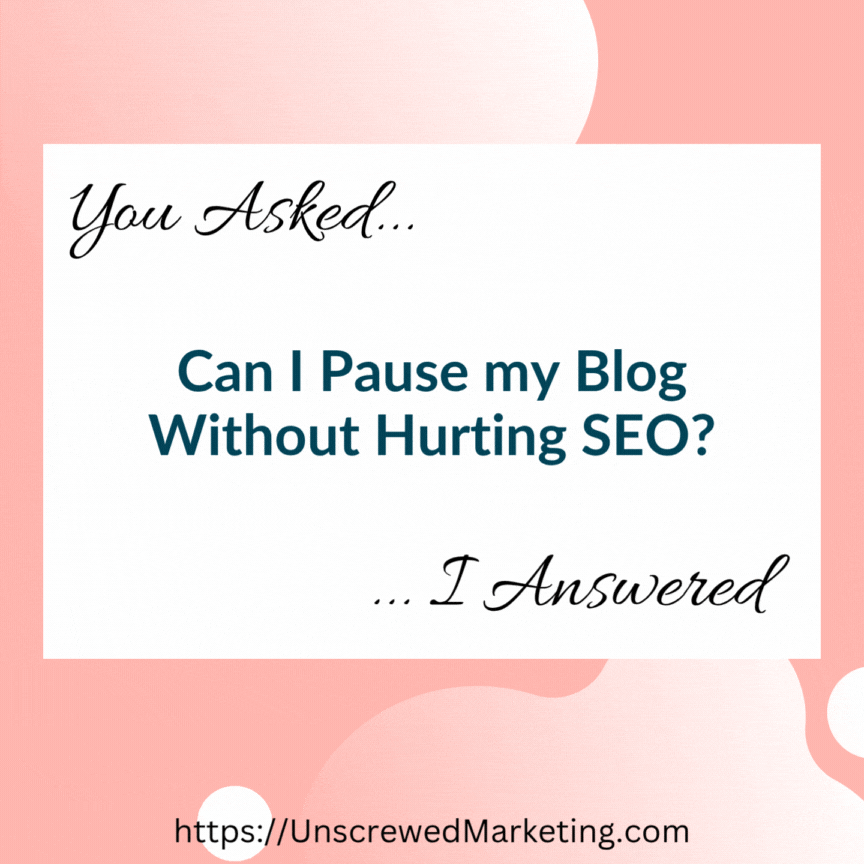- +1 512-591-8295
- [email protected]
- Mon - Fri: 9:00 - 16:00
- +1 512-591-8295
- [email protected]
- Mon - Fri: 9:00 - 16:00
Use code MOM50 at checkout thru Mother’s Day to get 50% off any gift card for marketing services

With everything in business seeming to slow down, I’ve been trying to figure out where to cut back—or at least where to reclaim some time.
I usually write my own blog articles, but I’m wondering if it’s okay to stop for a while. Will that really hurt anything, or is it fine to just pick it back up later?Sam L., consultant
Great question, Sam — and you’re right in the middle of what a lot of entrepreneurs are wrestling with right now.
When the economy tightens, marketing is often the first area business owners want to cut. Marketing budget feels more flexible compared to fixed costs like rent, software, or payroll.
But it’s also one of the worst areas to scale back on, even more so during a slowing economy. Marketing is what sustains visibility when everyone else is going quiet (you actually get your biggest bang for the buck then!).
If you want to see why this matters, I’ve written more here:
You might save some time now, and yes time is money. Sometimes increasing your bottom line means reallocating where you spend your time. If writing your own content isn’t in your zone of genius, that energy may actually be costing you more than it saves.
For many entrepreneurs, content creation is also a real expense, something they pay to outsource, so cutting it feels like the responsible move. But in both cases, the outcome is the same: a loss of long-term traction that’s much harder to rebuild.
Recently, Neil Patel’s agency (NP Digital) ran a test across ten websites; some that continued posting and others that paused content. It was one of the few controlled experiments comparing both traditional SEO and AI-driven SEO environments.
Here’s what the data revealed:
Sites that continued posting grew between 3% and 8% in regular SEO results. (Yes, even in the age of AI-SEO)
Those that stopped saw quick declines between 2% and 15%, depending on niche competitiveness.
In AI SEO (meaning how content surfaces in AI search results), posting consistency mattered even more. Sites that paused dropped out of AI-generated summaries entirely, while those that kept publishing continued showing up in those AI results.
When sites resumed content after a pause, it often took 3–6 months or more to fully recover to prior levels of visibility.
Neil’s study provided a good controlled snapshot. I’ve been doing SEO for two decades myself, (really successful SEO), and I’ve seen the same patterns across countless client sites in real-world conditions.
For example, one client retired but wanted to “dabble” for a while and keep her site up, because even in semi-retirement, she knew that prospective clients always check your website first. I told her to expect a gradual decline, and we were right, but it held steady much longer than anticipated. That plateau was proof of the strength of her organic foundation, and how long consistent, quality content continues working for you even after you stop. Eventually, though, the decline came, just as we’d planned for.
Another client was on the opposite end of the spectrum. Their entire marketing strategy had revolved around in-person events—conferences, sponsorships, workshops. When the pandemic hit, that entire channel disappeared overnight. They hired us to build a comprehensive marketing strategy that included a strong content plan from scratch, and we produced all of their content for them. Within months, they were seeing six figures in organic traffic per month and a surge of qualified inbound leads.
Once the world reopened, the CEO shifted back to in-person events—not because content wasn’t working (it absolutely was), but because that was his own comfort zone and the backbone of his brand. We continued to monitor the site’s analytics after the shift. For several months, organic traffic held steady—a testament to how strong that content foundation had become—but then the expected steady decline began. When the CEO noticed the lead flow drop, he restarted the content strategy, and their traffic began climbing again almost immediately.
That’s the real takeaway: organic marketing compounds slowly, but lasts a long time. And when you stop, the decay compounds too.
If you can’t maintain your previous posting rhythm, don’t stop completely—adjust strategically.
Keep publishing fresh content. Search engines and AI systems both prioritize recency. Even one new post a month can help keep your brand active in the index and prevent visibility decay.
Repurpose wisely. While your website thrives on fresh content, repurposing it multiple times across other platforms (social media, newsletters, podcasts) is actually better. Share your content again (here’s why) – it extends the life and reach of what you’ve already created.
Focus on MOFU and BOFU content. These stand for middle- and bottom-of-funnel—content designed for readers who are already comparing options or ready to buy. With AI-based search now delivering “complete” answers to users, this type of content is what keeps your brand visible to people actively ready to act.
Delegate strategically. We handle content marketing for numerous clients for whom we have had it running seamlessly for years. Most don’t even think of their content often … it just magically happens—quality content appearing regularly, without them lifting a finger—and it consistently delivers measurable results. If you’d rather spend your time in your zone of genius while staying visible, that’s exactly where we can help.
Use AI intentionally. ChatGPT can absolutely help you save time, but most entrepreneurs use it VERY wrong for their content—and end up diluting their brand and their reach. My AI-Assisted Brand Voice workshop shows you how to use it right so it supports your strategy and strengthens your voice.
Plan ahead. Use my content planning framework for planning and writing your content for the entire year. It removes the “what do I post this week?” stress and helps you stay consistent without wasting mental energy.
It might sound counterintuitive to spend money outsourcing something you used to do yourself—especially when the economy’s slow and you’re thinking of ways to cut money—but here’s why that thinking can backfire.
Your time has a dollar value. Every hour you spend outside your zone of genius—such as content writing, editing, formatting—is time you’re not using to generate higher-value revenue. When you outsource your content creation, you’re not just buying time; you’re investing in expertise that compounds.
Our content programs are designed to be far more affordable than most entrepreneurs realize—and the results are consistently stronger than what they can typically achieve on their own. We’ve refined every piece of the process, from SEO strategy to AI optimization, so the work we deliver doesn’t just fill your blog—it moves the needle on leads, authority, and visibility.
And when you compare that to the time (and future traffic) lost from going dark, the ROI becomes pretty obvious.
So yes, you could pause writing articles for your website.
But you’ll spend twice as long—and twice as much—trying to rebuild the momentum later. The smarter move is to scale strategically, not stop entirely.
Your website’s content is one of the few assets that keeps working for you long after it’s created. Don’t let it go dormant.
— Vicky Wu
Fresh content fuels both SEO and AI-based discovery—consistency matters more than volume.
Repurpose your content intelligently across platforms for exponential reach.
Prioritize MOFU and BOFU topics to reach the audiences already ready to buy.
Protect your zone of genius: outsource the rest.
Use AI to assist, not replace, your voice.
Marketing isn’t an expense; it’s leverage—especially when the economy is tight.
Your content should bring clients, not just clicks. Let’s fix that with a smarter plan.
Our CEO Vicky Wu brings her 30 years of experience marketing for Fortune 500 companies, multi-million and multi-billion-dollar global corporations to answer your specific marketing questions. Most entrepreneurs aren’t able to find – or afford – access to this level of expertise. And that’s exactly why we’re bringing it to you.

Schedule a Free 360° Marketing Consultation
to Brainstorm Best Marketing Practices that Get Results for Your Business
This website uses cookies to ensure you get the best experience on our website. By continuing to use the website, you agree to our use of cookies. We do not share or sell your information. More info